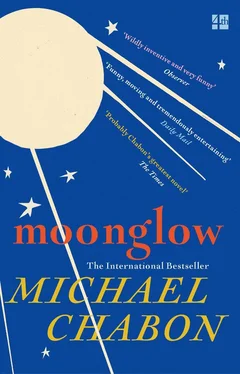1 ...7 8 9 11 12 13 ...24 “I am sure it will come as no surprise to you, soldier,” the man said in his Park Avenue drawl, “to learn that you are in trouble.”
“No, sir.”
“No, indeed. How could it? You went looking for trouble, and you found it. Consistent behavior produces predictable results.”
“Sir, I wasn’t looking for trouble, I—”
“Don’t bother to deny it. One glance at you and I know the whole story. You’ve been looking for trouble all your life.”
“Sir—”
“Am I wrong, soldier?”
“No, sir.”
“You stole equipment and materiel from the U.S Army. Went AWOL. Hot-wired a truck. Purloined a canoe. Planted live explosives on federal property.”
“That part was not the plan,” my grandfather said. “The live charge.”
“No? Then how did it happen?”
It was clear that Buck had already confessed to everything, but my grandfather had not given up the whiskered girl in the train yard, and he was unwilling to give up his friend, even if his friend had turned out to be a rat.
“It was a breakdown in leadership,” my grandfather confessed.
The eyes went abruptly from ice to fire. My grandfather had the disconcerting sensation of being loved by the beefy old man.
“Orlie Buck’s father served in the Fighting Sixty-ninth as my aide-de-camp,” the old man said. “He was always looking for trouble, too, and he knew that if ever he called out to me, I would hasten to his side and endeavor to get him out of whatever fix he was in, one way or another. I believe that is why, when those two snowdrops out there showed up to arrest him, Orlie reached out to his old uncle Bill.”
A seine of anecdotes, genealogies, and dark allusions let out by Orland Buck over the past few months cinched together all at once in my grandfather’s mind and caught a darting hope.
“Colonel Donovan, can you get me out of trouble, too?” my grandfather said.
“Well, my boy,” Wild Bill Donovan said, “you know, the truth is I probably could. But as we’ve already established, that’s not what you really want, now, is it?”
Following his arraignment on charges of assaulting the president of Feathercombs, my grandfather spent a week in jail. The bail was steep, and he had no collateral apart from a twenty-five-dollar reflecting telescope and a 1949 Crosley sedan.
Over that week he telephoned my grandmother twice. In the first call he misinformed her as to his whereabouts and said nothing at all about his arrest. The lawyer, Shulman, sent someone to pick up the Crosley from the garage on East Fifty-seventh and drive it back to New Jersey. The driver was instructed to tell my grandmother only that her husband planned to go by train on an urgent sales trip upstate.
On the fourth day of his stretch in the House of Detention, my grandfather phoned again. He provided my grandmother with memories not previously shared from a trip the previous August: a view from a motel window overlooking the rancid Susquehanna. An Italian restaurant that had served spaghetti in a green sauce called pesto . A long afternoon making sales calls in the heat. He had hated the job from the day he was hired, but now that he had lost it—demolished it—there was a retrospective charm in the tedium of those days spent barnstorming upstate beauty counters. Tears came to his eyes as he leaned against the outgoing-only pay phone in his gray jailhouse twills, eulogizing the wife of a pharmacist in Elmira who at first had taken only a case of Feathercombs but increased her order to three after he held up his demo mirror.
He never considered telling my grandmother the truth. She was already teetering; he was afraid the truth would push her over the edge. That was how he explained his subterfuge to himself, and to me thirty-two years later. It was not, in my view, a complete explanation. My grandfather never would have lied to exonerate himself, make himself look good, or evade responsibility. Unlike my grandmother, he did not seem to find pleasure or release in telling lies. But while he was a family man and loved us all in his wordless way, he was also, to the core, a solitary. If there was suffering to be endured, he preferred to withstand it alone. If he made a mess, he would clean it up himself. Unlike his wife, he was uncomfortable with make-believe, but his fetish for self-reliance made him secretive. So though it was true that psychiatrists, who got paid to know such things, had instructed him over the years to keep upsetting news away from my grandmother, it was also true that this advice suited his furtive nature. She was always threatening rain; he had been born with an umbrella in his hand.
The truth is that if he hadn’t been so worried about his wife’s mental state, my grandfather might have welcomed a couple of days in jail. Repentance is the most solitary of pursuits, and there could be no better place for penitence than shelved on a steel bunk in the Tombs. But scenarios of imminent breakdown and disaster at home began to obsess him. Though he hated asking for help more than anything else, in particular from people who loved him or would do it free of charge, my grandfather saw no alternative but to tell Shulman to try to track down his kid brother.
Uncle Ray had been ordained as a rabbi at the age of twenty-three, a wonder boy of learning. But sometime in the early 1950s my great-uncle had begun to reverse himself on questions of chance and divine intention. He had resigned his pulpit in northwest Baltimore and now made a good living hustling pool and poker up and down the Delmarva peninsula. To raise my grandfather’s bail, Ray required a week’s time, a supply of willing victims, and a surprise win by Hopeless Hope in the fifth at Hialeah.
My grandfather walked out of the Tombs with enough money for a shave, a bus, a Zagnut bar for my mother, and coffee and a donut for himself when he reached the Paterson bus terminal. Through Shulman, coached to represent himself to my grandmother as “a lawyer involved with your husband’s business,” my grandfather had arranged for his wife to meet his bus at ten-thirty.
At eleven-fifteen there was still no sign of her. He used his last dime to call the house.
“I’m here,” he said.
“Here? Where is here?”
“In Paterson. At the bus.”
“Paterson,” she repeated. She might have heard rumors, her tone suggested, of there being such a place. She found her adopted homeland overburdened by places with preposterous names.
“Didn’t Shulman tell you?”
“Shulman? Who is this Shulman?”
“The lawyer. Shulman.”
“Shulman is the lawyer. Yes, I see.” You would have assumed she was jotting the words down for subsequent study: Paterson . Shulman . Lawyer . “And now tell me, please, who are you?”
Only much later did my grandfather learn there had been a story in the Daily News . But he understood now that in spite of his efforts, word had spread.
“Look,” he said. “I don’t know what to say. I’m sorry.”
“Are you? And why is that?”
“Darling, I know. I did a terrible thing, I’ll sort it out. I swear. I could not be more sorry. I know how worried you must have been.”
“Oh, but not in the least!” Because of her French accent, there was always a showiness to my grandmother’s sarcasm. “Every time I’m starting to worry, then I think of you jumping out of the airplane, bringing emergency hair combs to the dishevel-ded ladies of Binghamtown, New York.”
He winced, recognizing in this distorted version the lameness of the cover story he had concocted with Shulman. To sell it—as she clearly understood—he had been counting on the marginality of Binghamton to his immigrant wife’s disorderly mental maps. But as usual she had seen through him and his stratagems. Like many of the spouses of “the lucky ones,” my grandfather had observed that what got labeled luck was really stubbornness married to a knack for observation, a fluid sense of the truth, a sharp ear for lies, and a deeply suspicious nature. They’d had the same type of luck in South Philadelphia, but there you could do more with it than merely survive.
Читать дальше












